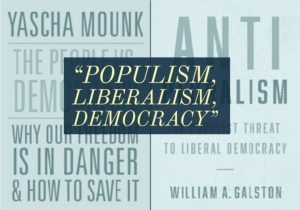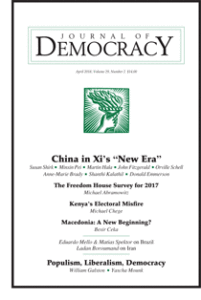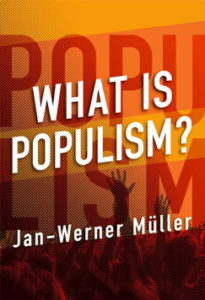 Europe is in a tough spot, as it tries to reconcile the rise of populism with the need to confront migration, climate change, the digital revolution, the structure of its governance, and an eternal Brexit, The New Yorker’s Lauren Collins writes. French President Emmanuel Macron is one of the few European leaders to recognize the urgency of the threat and to prescribe democratic renewal as the necessary response.
Europe is in a tough spot, as it tries to reconcile the rise of populism with the need to confront migration, climate change, the digital revolution, the structure of its governance, and an eternal Brexit, The New Yorker’s Lauren Collins writes. French President Emmanuel Macron is one of the few European leaders to recognize the urgency of the threat and to prescribe democratic renewal as the necessary response.
If his ‘Macronism’ succeeds, it could be the beginning of a renewal of French democracy; if it fails, it will have been an interregnum before the era of Le Pen and her brand of far-right populism. The European elections in May served as a sort of midterm checkup, she observes;
“On the national level, this is the confirmation of 2017,” Macron told me. “A lot of politicians thought that 2017 was an exception, or something like an aberration. This is no longer the case.” ….”I hate solutions without problems,” Macron told me at the Élysée. The remark—a little bit corporate, a little bit profound—brought home for me the pragmatic, post-ideological bent of his politics. …As Macron’s former advisers Ismaël Emelien and David Amiel recently wrote, the strategy is to “identify the causes of the populist vote and respond methodically. If we succeed, we will dry it up.”
 According to Jan-Werner Müller’s* excellent book Contesting Democracy: Political Ideas in Twentieth-Century Europe, the extension of the franchise at the end of the 19th century saw the irruption of the masses into politics, ending the idea of politics as an elitist gentleman’s club, and generating a crisis of representation at two levels, notes analyst Stephane Wolton:
According to Jan-Werner Müller’s* excellent book Contesting Democracy: Political Ideas in Twentieth-Century Europe, the extension of the franchise at the end of the 19th century saw the irruption of the masses into politics, ending the idea of politics as an elitist gentleman’s club, and generating a crisis of representation at two levels, notes analyst Stephane Wolton:
- One question was who is represented, or can the old elites properly represent the new members of the polity?
- The second was about what type of claims can be made within the political system, or how can the interests of the masses be accommodated.
Two competing (broad) answers were proposed: the politics of moderation (or compromise), and the militarized politics of the will. The latter was tried first, and only its failure left political space for the former, he writes for Democratic Audit.
 The conventional wisdom overstates the role of economic insecurity as a principal driver of populism in several ways, Tel Aviv University’s Yotam Margalit contends in Economic Insecurity and the Causes of Populism, Reconsidered:
The conventional wisdom overstates the role of economic insecurity as a principal driver of populism in several ways, Tel Aviv University’s Yotam Margalit contends in Economic Insecurity and the Causes of Populism, Reconsidered:
- First, it conflates the significance of economic insecurity in influencing election outcomes on the margin with its significance in explaining the overall populist vote. The empirical findings indicate that the share of populist support explained by economic insecurity is very limited.
- Second, immigration – a key issue for many populist parties – is an economic driver of populism insofar as immigration itself is largely motivated by economic considerations. However, voters’ concerns about immigration are only marginally shaped by its repercussions on their economic
standing. - Third, economic-centric accounts treat cultural concerns of populist voters as largely a byproduct of the experience of adverse economic change. This approach underplays the reverse process whereby disaffection stemming from social and cultural change underlies both perceptions of economic disadvantage and support for populism.
Consequently, taken together, policies aimed at alleviating economic insecurity are likely to have only a modest impact on the populist appeal, he contends.
Pointing out that populists benefit most from economic dislocation is one thing; explaining why them and not others is another, the LSE’s Wolton writes:
 One possible factor is voters’ distrust of more traditional parties, especially social democrats. From the end of World War II to the mid-1980s, Western democracies effectively became social democracies. Right- and left-wing parties practised the politics of compromise and incremental change, whereby trade unions and corporations, government and opposition negotiated until a solution acceptable to all parties could be found. But compromise and its constant tinkering are for small changes, not revolutionary transformations. However, instead of constant discussion and adaption, economic losers demand actions – a counter-revolution no less. …
One possible factor is voters’ distrust of more traditional parties, especially social democrats. From the end of World War II to the mid-1980s, Western democracies effectively became social democracies. Right- and left-wing parties practised the politics of compromise and incremental change, whereby trade unions and corporations, government and opposition negotiated until a solution acceptable to all parties could be found. But compromise and its constant tinkering are for small changes, not revolutionary transformations. However, instead of constant discussion and adaption, economic losers demand actions – a counter-revolution no less. …- A second factor facilitating populist success [also discussed in the NED’s Journal of Democracy – above] is ‘descriptive representation’, to borrow from Hannah Pitkins. … Populists signal that economic losers can trust their party because they field candidates who are like them. For example, those who have lost out from economic changes are over-represented in the candidates put forward by the Sweden Democrats, whereas they are under-represented in all other parties.
- Populists do more than represent (at least descriptively) economic losers. They also advance a particular vision of politics. They adhere to Carl Schmidt’s vision that politics is determined by the distinction between friends and enemies….
*Also the author of What Is Populism? (above).







